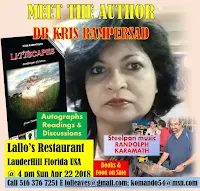 |
| Children of Leela's Learning centre are glued to Dr Kris Rampersad presenting novel ways of inspiration. |
Read more here ...
To Learn More about the integrated approach to lifelong learning, I the Sky& Me the Sea, visit here
If you would like to sponsor copies to schools, libraries and communities email lolleaves@gmail.com.
To find out more about LiTTscapes, LiTTours & LiTTributes is transforming the Global, Local & Caribbean environments and to partner and support these efforts visit here
To find my new publication, visit Kris Rampersad Amazon Author Page
Learn more about Dr Kris Rampersad and how you can get involved here:




































